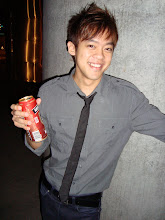
Remember how our budget this year comprises past reserves? And that in Singapore, in order for the government to draw from the reserves, they need the permission of the President? It's supposed to be some kind of safeguard against a rogue government misappropriating the reserves.
The argument was that the procedures following the President's decision to "turn the second key" and allow access to the reserves were not published and it seemed that our dear President merely did what the government told him to do. Even if that was true, it should come as no surprise. I remember being told in lower secondary the reason why we study history - to not repeat mistakes of others.
Anyway, now the President has spoken up:
"It is not easy to say 'yes' in so far as the withdrawal of the reserves go. There must be compelling reasons why we have to resort to withdrawing from past reserves," the president said.
and
"But I have the advice of the Council of Presidential Advisers, which I have to pay regard to. And we started the process of consulting together and I then left it to them to deliberate on their own and give me their recommendations, which were consistent with what I had felt I should do."
Now who on earth are on the Council of Presidential Advisers? If the President acts on the advice of his advisers and the President's role is to safeguard the reserves from potentially rogue governments, then it makes sense that the council be made up of wholly independent members, yes?
Let's see who these important people are:
The 1991 Constitutional Amendment also provided for the establishment of a Council of Presidential Advisers (CPA) to advise the President. It is obligatory for the President to consult the Council before he vetoes the budgets of the Government and key government-linked bodies and the appointments of government nominees to key posts.
Obligatory? I wonder if the constitution allows for the President to listen to the advice of the council, process it, then decide on something else.
The Council comprises six members and two alternate members. Two members are appointed by the President at his discretion, two are the Prime Minister's nominees, one is the Chief Justice's nominee and one is the nominee of the Chairman of the Public Service Commission. One alternate member is appointed by the President at his discretion while the other is appointed by the President on the advice of the Prime Minister, in consultation with the Chief Justice and Chairman of Public Service Commission.
Ok let's see, two members appointed by Our Dear President at his discretion, so far so good. Two appointed by the Prime Minister, er, oookay. So a rogue PM would be able to appoint two goons. Now, Chairman of the Public Service Commission - typically ex-government. I'm lazy to elaborate on the rest, but you get the idea. Appointed by President on the advice of the Prime Minister. That cracks me up a little though.
Members are appointed on a six-year term on their first appointment. They are eligible for re-appointment for further terms of 4 years each. Alternate members are appointed on a four-year term. The present Chairman, Mr J Y Pillay is also the Chairman of the Singapore Exchange Limited. As Chairman of the Council of Presidential Advisers, Mr Pillay exercises the functions of the office of the President in the absence of the President. If he is unavailable, this duty then falls on the Speaker of Parliament.
All's good though, according to our President:
At the end of the day, Mr Nathan said the system was tested and he has responded to the urgency of the situation after clinically examining the government's proposal to use past reserves to battle the economic downturn.
Loved and Trusted:
Although a Straits Times survey showed that nearly 80 per cent of Singaporeans hoped for a contest, Nathan nonetheless took up office unopposed as President on August 18, 1999. His nomination was strongly supported by Minister Mentor Lee Kuan Yew (then holding the post of Senior Minister). He succeeded the fifth President of Singapore Ong Teng Cheong and was sworn in on September 1, 1999.
On July 12, 2005, Nathan announced that he was seeking re-election as President. He submitted an eligibility application to the Presidential Elections Committee; by August 6, 2005, three more people had also submitted forms, but on August 13, 2005, the Committee announced that the other three applicants had been rejected as ineligible. Nathan returned unopposed on nomination day, August 17, 2005. He was sworn in for a second term of office on September 1, 2005.


No comments:
Post a Comment